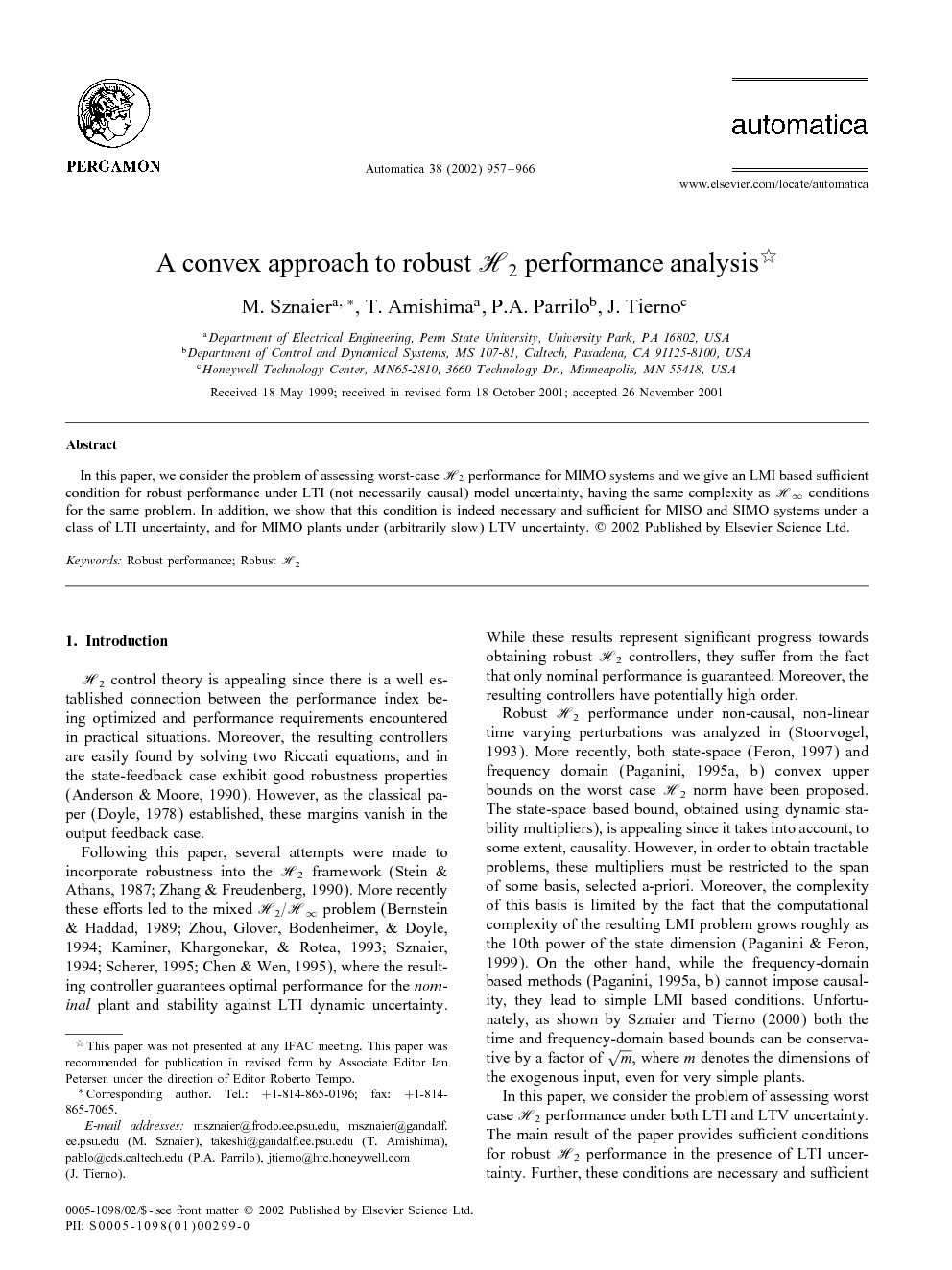In this paper, we consider the problem of assessing worst-case performance for MIMO systems and we give an LMI based sufficient condition for robust performance under LTI (not necessarily causal) model uncertainty, having the same complexity as conditions for the same problem. In addition, we show that this condition is indeed necessary and sufficient for MISO and SIMO systems under a class of LTI uncertainty, and for MIMO plants under (arbitrarily slow) LTV uncertainty.
control theory is appealing since there is a well established connection between the performance index being optimized and performance requirements encountered in practical situations. Moreover, the resulting controllers are easily found by solving two Riccati equations, and in the state-feedback case exhibit good robustness properties (Anderson & Moore, 1990). However, as the classical paper (Doyle, 1978) established, these margins vanish in the output feedback case.
Following this paper, several attempts were made to incorporate robustness into the framework (Stein & Athans, 1987; Zhang & Freudenberg, 1990). More recently these efforts led to the mixed problem (Bernstein & Haddad, 1989; Zhou, Glover, Bodenheimer, & Doyle, 1994; Kaminer, Khargonekar, & Rotea, 1993; Sznaier, 1994; Scherer, 1995; Chen & Wen, 1995), where the resulting controller guarantees optimal performance for the nominal plant and stability against LTI dynamic uncertainty. While these results represent significant progress towards obtaining robust controllers, they suffer from the fact that only nominal performance is guaranteed. Moreover, the resulting controllers have potentially high order.
Robust performance under non-causal, non-linear time varying perturbations was analyzed in (Stoorvogel, 1993). More recently, both state-space (Feron, 1997) and frequency domain (Paganini 1995a and Paganini 1995b) convex upper bounds on the worst case norm have been proposed. The state-space based bound, obtained using dynamic stability multipliers), is appealing since it takes into account, to some extent, causality. However, in order to obtain tractable problems, these multipliers must be restricted to the span of some basis, selected a-priori. Moreover, the complexity of this basis is limited by the fact that the computational complexity of the resulting LMI problem grows roughly as the 10th power of the state dimension (Paganini & Feron, 1999). On the other hand, while the frequency-domain based methods (Paganini 1995a and Paganini 1995b) cannot impose causality, they lead to simple LMI based conditions. Unfortunately, as shown by Sznaier and Tierno (2000) both the time and frequency-domain based bounds can be conservative by a factor of , where m denotes the dimensions of the exogenous input, even for very simple plants.
In this paper, we consider the problem of assessing worst case performance under both LTI and LTV uncertainty. The main result of the paper provides sufficient conditions for robust performance in the presence of LTI uncertainty. Further, these conditions are necessary and sufficient for a class of SIMO and MISO systems or for MIMO systems subject to (arbitrarily slowly) time varying perturbations.
For simplicity, in the sequel all the derivations are carried out in the discrete-time case. However, the formulae apply as well to continuous-time systems with minimal modifications.
In this paper, we use simple μ-analysis techniques to obtain sufficient (in fact necessary and sufficient in the MISO and MISO cases when the uncertainty structure satisfies 2S+F⩽2) conditions for robust performance under LTI or slowly LTV structured perturbations. Since these conditions are essentially the integral of μ over the frequency, their complexity is the same as that of analysis for the same problem. As a corollary, it follows that robust analysis using set modelling of white noise ( Paganini, 1995a) is indeed exact in the SISO case, and that the worst possible case in the MIMO case is .
A potentially serious drawback of the proposed approach is that in its present form it cannot impose causality constraints on the model uncertainty. However, this drawback is balanced by its ability to handle MIMO systems in a less conservative fashion, the lack of restrictions on the order of the multipliers X(ω), and the modest computational complexity increase with the order of the plant. As discussed by Paganini and Feron (1999) the relative weight of the last two effects is problem dependent, with the ability to use high order multipliers tending to outweight the causality constraints as the order of the plant M grows.
Research is currently underway seeking to develop a frequency-domain method capable to incorporate the effects of causality.


